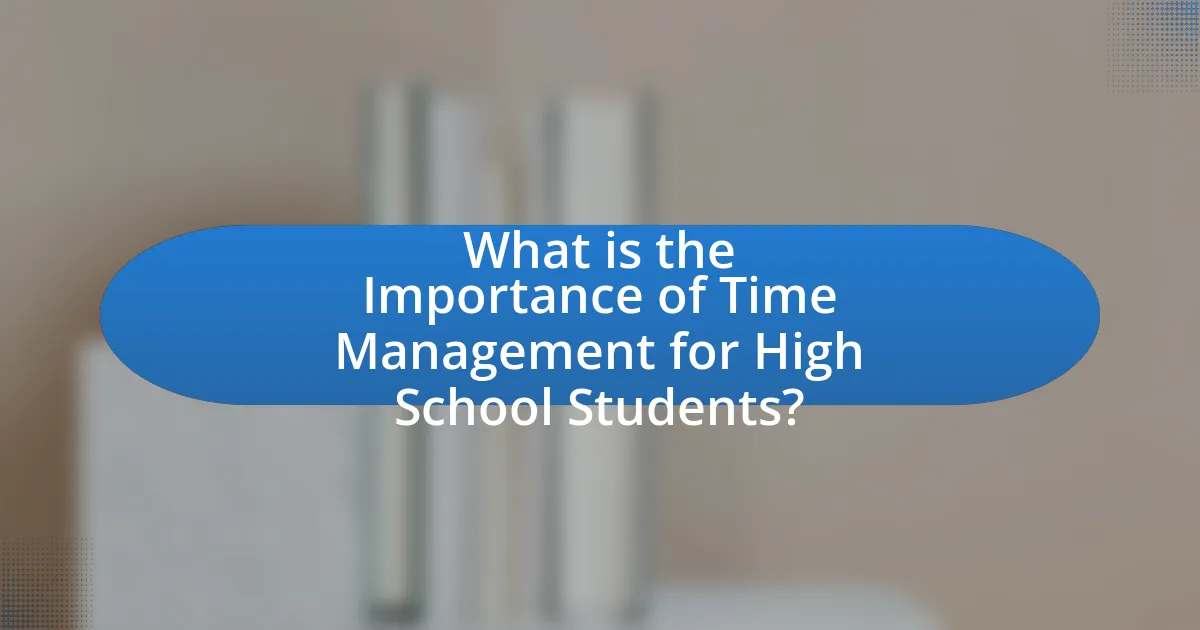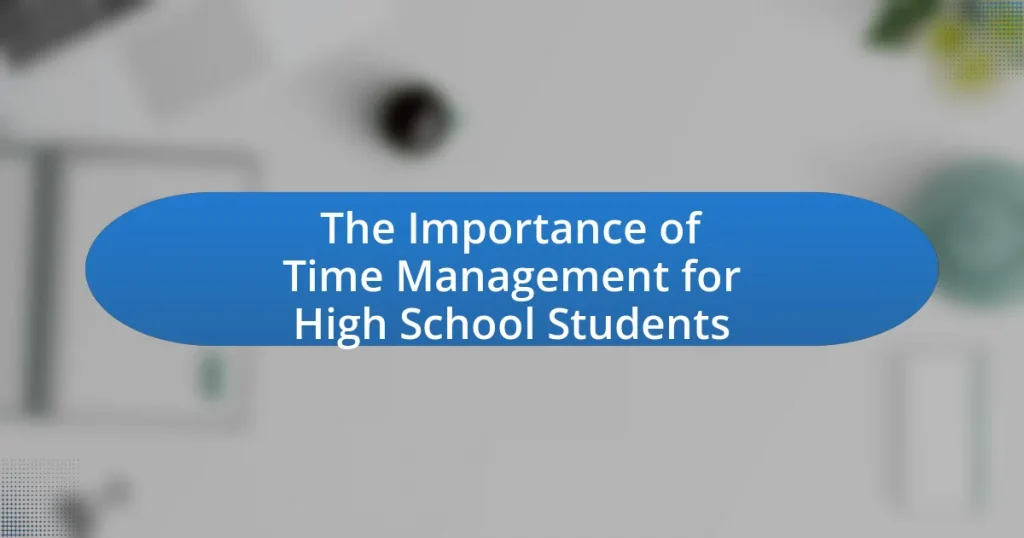The article focuses on the importance of time management for high school students, highlighting its role in enhancing academic performance and reducing stress. It discusses how effective time management enables students to prioritize tasks, balance academic and extracurricular commitments, and ultimately achieve better grades and mental well-being. Key components of time management, such as goal setting, prioritization, and planning, are outlined, along with techniques for creating balanced schedules and overcoming common distractions. The article also emphasizes the long-term benefits of mastering time management skills, including improved productivity, life skills development, and future academic and career success.

What is the Importance of Time Management for High School Students?
Time management is crucial for high school students as it enhances academic performance and reduces stress. Effective time management allows students to prioritize tasks, allocate sufficient time for studying, and balance extracurricular activities, leading to improved grades and overall well-being. Research indicates that students who practice good time management skills are more likely to achieve their academic goals and experience lower levels of anxiety (Britton & Tesser, 1991, Journal of Educational Psychology). This demonstrates that mastering time management not only fosters academic success but also contributes to healthier mental health among high school students.
Why is time management crucial for high school students?
Time management is crucial for high school students because it enables them to balance academic responsibilities, extracurricular activities, and personal commitments effectively. By mastering time management skills, students can prioritize tasks, reduce stress, and improve their academic performance. Research indicates that students who practice effective time management are more likely to achieve higher grades and have better overall well-being. For instance, a study published in the Journal of Educational Psychology found that students who utilized time management techniques reported lower levels of anxiety and higher levels of academic success.
How does effective time management impact academic performance?
Effective time management significantly enhances academic performance by allowing students to allocate sufficient time for studying, completing assignments, and preparing for exams. When students effectively manage their time, they can prioritize tasks, reduce procrastination, and maintain a balanced workload, which leads to improved understanding of the material and higher grades. Research conducted by Britton and Tesser (1991) in the Journal of Educational Psychology found that students who practiced effective time management techniques achieved better academic outcomes compared to those who did not. This correlation underscores the importance of time management skills in fostering academic success among high school students.
What role does time management play in reducing stress?
Time management plays a crucial role in reducing stress by allowing individuals to prioritize tasks and allocate time effectively. When high school students manage their time well, they can break down assignments into manageable parts, set realistic deadlines, and avoid last-minute cramming, which significantly lowers anxiety levels. Research indicates that students who utilize time management techniques report lower stress levels and higher academic performance, as they feel more in control of their workload and deadlines. For instance, a study published in the Journal of Educational Psychology found that effective time management is linked to reduced stress and improved academic outcomes among students.
What are the key components of effective time management?
The key components of effective time management include goal setting, prioritization, planning, and self-discipline. Goal setting involves defining clear, achievable objectives, which provides direction and motivation. Prioritization helps in identifying tasks based on their urgency and importance, allowing individuals to focus on what matters most. Planning entails creating a structured schedule that allocates specific time slots for tasks, ensuring that deadlines are met. Self-discipline is crucial for adhering to the planned schedule and resisting distractions. Research indicates that students who practice these components tend to achieve higher academic performance and better manage stress, as evidenced by a study published in the Journal of Educational Psychology, which found that effective time management correlates with improved grades and reduced anxiety among high school students.
What techniques can students use to prioritize tasks?
Students can use techniques such as the Eisenhower Matrix, ABC prioritization, and time blocking to prioritize tasks effectively. The Eisenhower Matrix helps students categorize tasks based on urgency and importance, allowing them to focus on what truly matters. ABC prioritization involves labeling tasks as A (high priority), B (medium priority), or C (low priority), which clarifies what needs immediate attention. Time blocking allocates specific time slots for different tasks, ensuring that students dedicate focused periods to high-priority activities. These methods are supported by research indicating that structured prioritization improves productivity and reduces stress among students.
How can students create a balanced schedule?
Students can create a balanced schedule by prioritizing their tasks and allocating specific time blocks for academics, extracurricular activities, and personal time. Effective time management techniques, such as the Eisenhower Matrix, help students distinguish between urgent and important tasks, allowing them to focus on what truly matters. Research indicates that students who utilize structured scheduling techniques report higher academic performance and lower stress levels, demonstrating the effectiveness of a balanced approach to time management.
What challenges do high school students face in managing their time?
High school students face significant challenges in managing their time, primarily due to competing academic demands, extracurricular activities, and social pressures. These students often juggle multiple subjects with varying workloads, leading to difficulties in prioritizing tasks effectively. Research indicates that 70% of high school students report feeling overwhelmed by their responsibilities, which can result in procrastination and poor time allocation. Additionally, the increasing involvement in sports, clubs, and part-time jobs further complicates their ability to create a balanced schedule. This combination of factors contributes to stress and can negatively impact their academic performance and overall well-being.
How do extracurricular activities affect time management?
Extracurricular activities significantly enhance time management skills among high school students. Engaging in these activities requires students to balance academic responsibilities with commitments such as sports, clubs, or volunteer work, thereby fostering prioritization and scheduling abilities. Research indicates that students involved in extracurriculars often develop better organizational skills, as they must allocate time effectively to meet various demands. A study published in the Journal of Educational Psychology found that students participating in structured extracurricular programs reported improved time management and academic performance, demonstrating a direct correlation between these activities and enhanced time management capabilities.
What distractions hinder effective time management for students?
Distractions that hinder effective time management for students include social media, mobile phones, and environmental noise. Social media platforms, such as Instagram and TikTok, can consume significant amounts of time, with studies indicating that students spend an average of 2-3 hours daily on these sites, detracting from study time. Mobile phones often serve as a source of constant notifications, which can interrupt focus and lead to procrastination. Additionally, environmental noise, such as conversations or music, can disrupt concentration, making it difficult for students to maintain productivity. These distractions collectively contribute to poor time management, impacting academic performance and overall success.
How can students improve their time management skills?
Students can improve their time management skills by implementing structured planning techniques such as creating a daily schedule and setting specific goals. Research indicates that students who utilize planners or digital tools to organize their tasks are more likely to meet deadlines and reduce procrastination. A study published in the Journal of Educational Psychology found that effective time management correlates with higher academic performance, demonstrating that students who prioritize their tasks and allocate time effectively achieve better results.
What tools and resources are available for better time management?
Effective time management tools and resources include digital planners, task management apps, and time-tracking software. Digital planners like Google Calendar allow students to schedule classes, assignments, and extracurricular activities, providing a visual overview of their commitments. Task management apps such as Todoist or Trello help students prioritize tasks and set deadlines, enhancing productivity. Time-tracking software like Toggl enables students to monitor how they spend their time, allowing for adjustments to improve efficiency. Research indicates that students who utilize these tools report better organization and reduced stress levels, highlighting their effectiveness in managing time effectively.
How can students set realistic goals and deadlines?
Students can set realistic goals and deadlines by using the SMART criteria, which stands for Specific, Measurable, Achievable, Relevant, and Time-bound. This framework helps students clarify their objectives and create a structured timeline for achieving them. For example, instead of saying “I want to study more,” a student could specify, “I will study math for 30 minutes every day after school.” Research shows that students who set SMART goals are more likely to succeed academically, as they provide clear direction and motivation. Additionally, breaking larger tasks into smaller, manageable steps can help students avoid feeling overwhelmed and ensure they meet their deadlines effectively.
What are the long-term benefits of mastering time management?
Mastering time management leads to improved productivity and reduced stress over the long term. Effective time management allows individuals to prioritize tasks, allocate resources efficiently, and meet deadlines consistently, which enhances overall performance. Research indicates that students who practice strong time management skills are more likely to achieve academic success, as evidenced by a study published in the Journal of Educational Psychology, which found that students with effective time management strategies had higher GPAs. Additionally, mastering time management fosters better work-life balance, enabling individuals to allocate time for personal interests and relationships, ultimately contributing to greater life satisfaction.
How does time management influence future academic and career success?
Time management significantly influences future academic and career success by enhancing productivity and reducing stress. Effective time management allows individuals to prioritize tasks, meet deadlines, and allocate sufficient time for study and skill development, which are crucial for academic achievement. Research indicates that students who practice good time management skills tend to achieve higher grades and have better retention of information, as evidenced by a study published in the Journal of Educational Psychology, which found that students with strong time management skills had a GPA that was, on average, 1.5 points higher than those without such skills. Furthermore, in the professional realm, individuals who manage their time well are often viewed as more reliable and competent, leading to better job performance and career advancement opportunities.
What life skills are developed through effective time management?
Effective time management develops critical life skills such as organization, prioritization, and self-discipline. Organization skills are enhanced as individuals learn to structure their tasks and commitments efficiently, leading to improved productivity. Prioritization skills are cultivated as individuals assess the importance and urgency of tasks, enabling them to focus on what truly matters. Self-discipline is strengthened through the consistent practice of adhering to schedules and deadlines, fostering a sense of responsibility and accountability. These skills are essential for academic success and future professional environments, as they contribute to better decision-making and stress management.
What practical tips can help high school students manage their time effectively?
High school students can manage their time effectively by prioritizing tasks, creating a structured schedule, and utilizing tools like planners or digital calendars. Prioritizing tasks involves identifying which assignments or activities are most urgent or important, allowing students to focus on what needs immediate attention. Creating a structured schedule helps students allocate specific time blocks for studying, extracurricular activities, and relaxation, ensuring a balanced approach to their responsibilities. Utilizing planners or digital calendars aids in visualizing deadlines and commitments, which can enhance organization and reduce procrastination. Research indicates that students who employ time management strategies tend to achieve higher academic performance, as they can better balance their workload and reduce stress.


